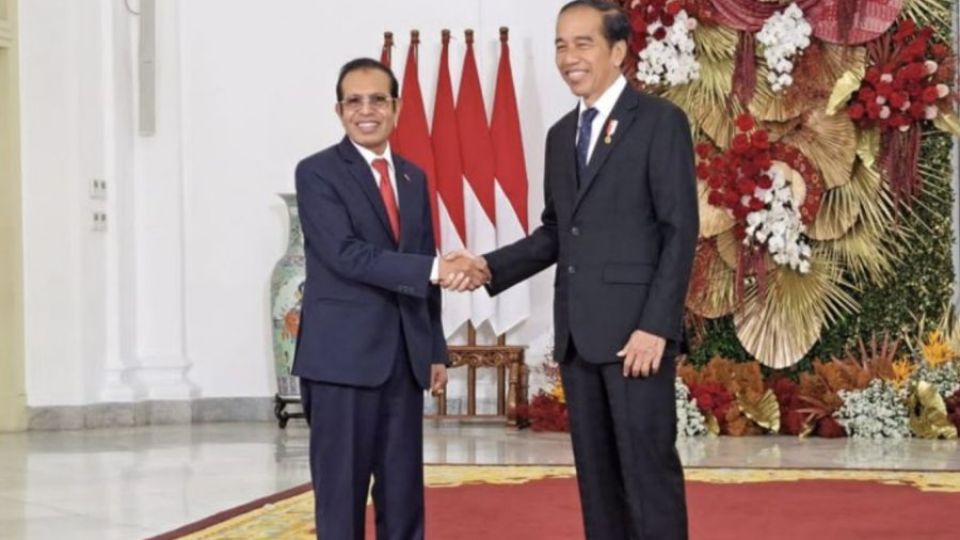February 20, 2023
JAKARTA – Timor Leste’s full membership to ASEAN, which is set to be finalized by the end of this year, can help Indonesia advance its diplomatic agenda of peace and democracy.
Amid an “increasingly conservative” Southeast Asia, its membership would grant the relatively more-progressive Indonesia an “ally” in the association, analysts suggest, although Dili would still need Jakarta’s assistance to cushion its limited economic prowess.
Recent weeks have seen Timor Leste begin to hit its diplomatic stride to establish a more solid presence within Southeast Asia’s premier organization, from its historic debut appearance as observer at the ASEAN Foreign Ministers’ Meeting (AMM) earlier this month to Prime Minister Taur Matan Ruak’s talks with President Joko “Jokowi” Widodo at Bogor Palace on Monday.
During the bilateral meeting, Jokowi reaffirmed Indonesia’s commitment to cooperating with Timor Leste, stating that border disputes with Dili in the Noel Besi-Citrana and Bidjael Sunan-Oben regions would soon be resolved so as to smoothen the road for future cooperation.
The roadmap for Timor Leste’s full membership to ASEAN was also in the works, Jokowi said, noting that he was glad about its in-principle admission to the 10-nation bloc.
Jokowi’s expression of content may well go beyond sheer politeness, experts have suggested, as there were notable incentives for Jakarta to lend a helping hand in the ASEAN admissions process. The association, some say, was becoming increasingly conservative and Dili’s strong pro-democracy stance could help Jakarta’s similar stance during regional negotiations.
“Helping Timor Leste can help Indonesia prove to itself that it is a mature state, one that can enjoy good relations with a country it was previously in conflict with,” said Randy Nandyatama, a senior fellow at Gadjah Mada University’s (UGM) ASEAN Studies Center, on Tuesday.
“But far more crucial would be Dili’s impact on ASEAN’s composition. […] Timor Leste’s entry will be an important factor in balancing the makeup of the association, especially in favoring more progressive ideas,” he told The Jakarta Post.
Helping hand
Since gaining independence from Indonesia in 1999, Timor Leste has flourished into one of the more progressive democracies in Southeast Asia. Despite their troubled shared history, the two countries have embraced democracy and bolstered neighborly cooperation.
In the early 2000s up until the 2010s, Randy explained, ASEAN countries enjoyed what he referred to as a “honeymoon period of democratization,” where many basked for years in newfound civil liberties, before falling into more authoritative modes of governing.
Myanmar has recently become the prime example of this phenomenon, while others like Cambodia and Thailand are arguably also struggling with similar issues, he said.
Indonesia, among the few countries within the region still championing liberal democratic ideals, would find an ally in Timor Leste, Randy suggested.
Jakarta could even learn a thing or two about democracy from its former colonial subject, said senior international relations expert Dewi Fortuna Anwar of the National Research and Innovation Agency (BRIN).
“Timor Leste’s Freedom House score is much higher than any ASEAN country, including Indonesia. The latter has experienced a significant democratic backsliding in recent years,” Dewi said, in reference to the United States nonprofit that regularly assesses the condition of political rights and civil liberties around the world.
If Indonesia was serious about its plans to reaffirm ASEAN centrality, Dewi argued, then it would aid Timor Leste in its accession, as Dili had on many occasions reaffirmed its seriousness in upholding the bloc’s primacy in the region.
In September 2022, for example, Timor Leste’s independence hero and first president Xanana Gusmao in a virtual forum acknowledged the increasingly hostile nature of the geopolitical landscape and placed his faith in Indonesia to lend a helping hand in expediting Dili’s membership.
“Our world is changing. The post-Cold War period of relative peace is over,” Gusmao said at the time. “Now, more than ever, we need the big nation of Indonesia to continue to stand tall in the faith of international law and promote dialogues between groups and countries.”
Lowest denominator
But not all is rosy. There was no getting around the elephant in the room, Randy said about some of Timor Leste’s shortcomings in the ASEAN context.
For starters, membership obligations consisting of a commitment to attend and host meetings, on top of an annual “equal contribution” fee for the group budget, may burden Dili’s economy and hinder the group as a whole.
“Indonesia could try to, say, adjust ASEAN’s management system such that the yearly fee would be based on each nation’s GDP instead of a standardized amount. Otherwise, this would become a very real problem,” he said.
Current ASEAN standards, the analyst said, take the bloc’s smallest economy as the biggest consideration in setting an “equal contribution” fee and if Timor-Leste becomes that benchmark, the group would have no choice but to settle with a much slimmer budget going forward.
In 2022, Timor Leste’s gross domestic product (GDP) was around US$2.45 million, according to International Monetary Fund data. This number was far below Laos’ $16 million, ASEAN’s lowest-earning country for the same year, though analysts have also pointed out the vast economic discrepancy between the current existing 10 ASEAN countries.


